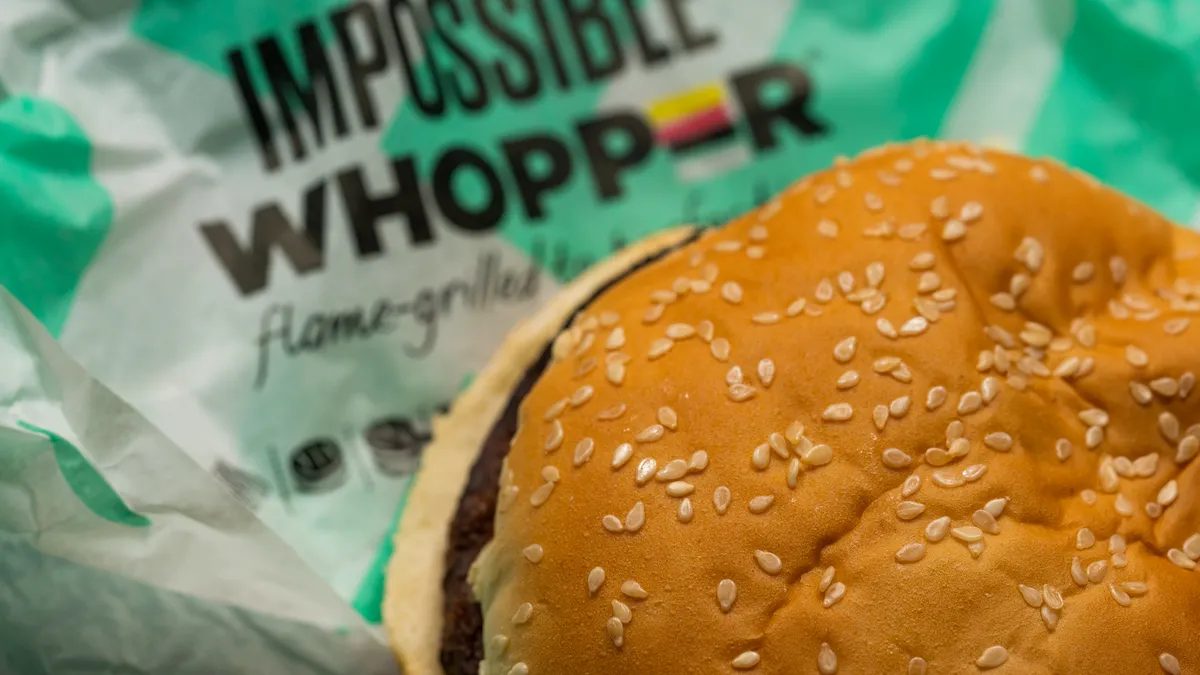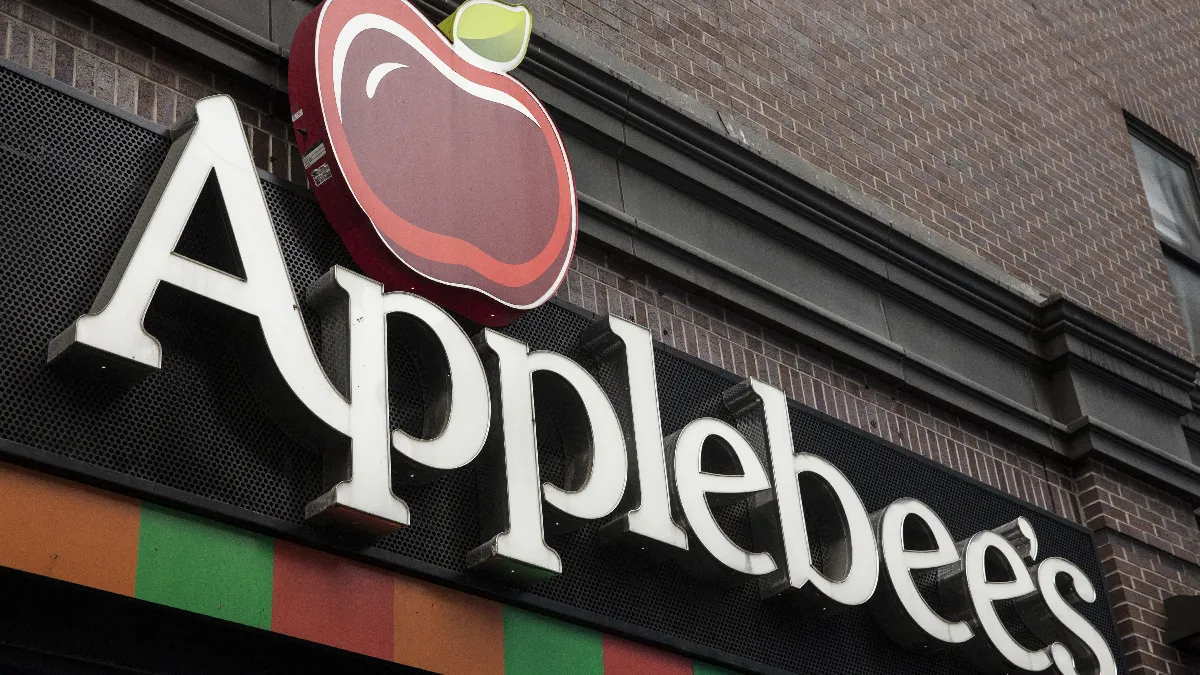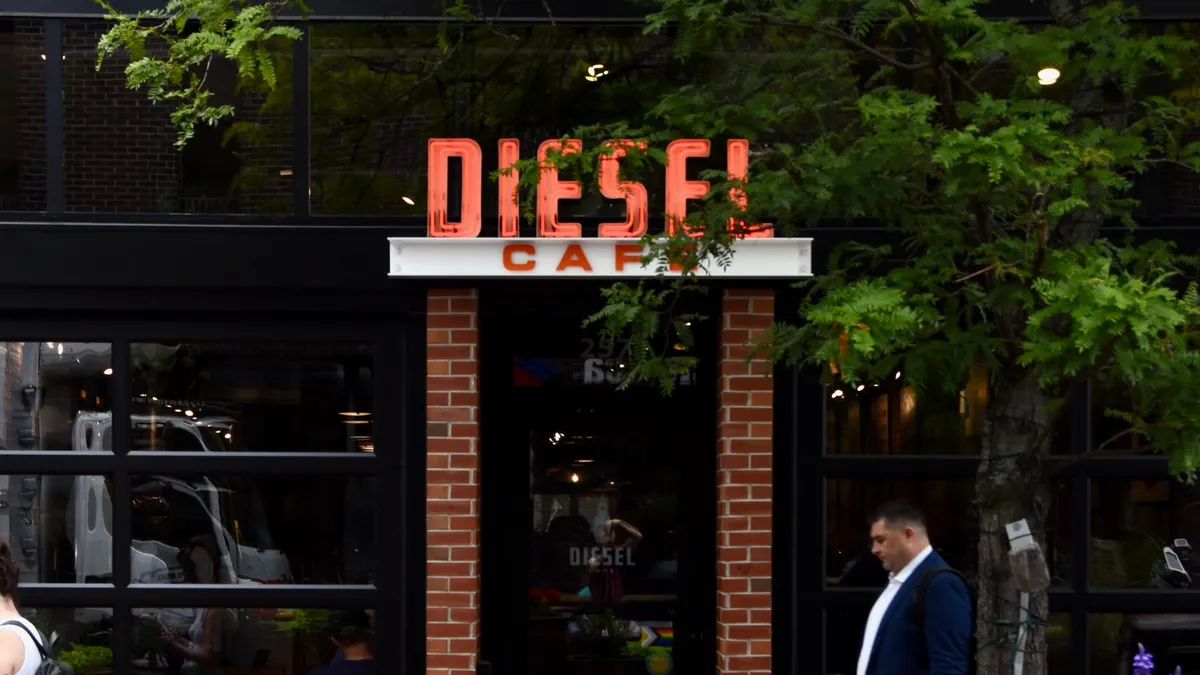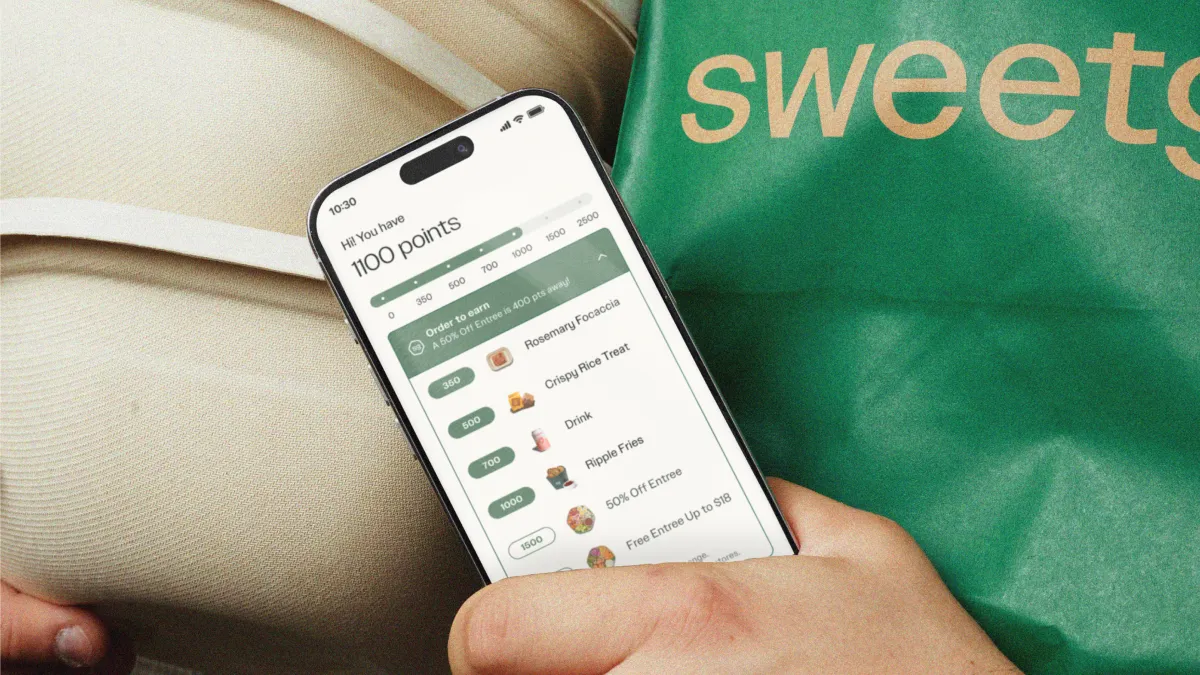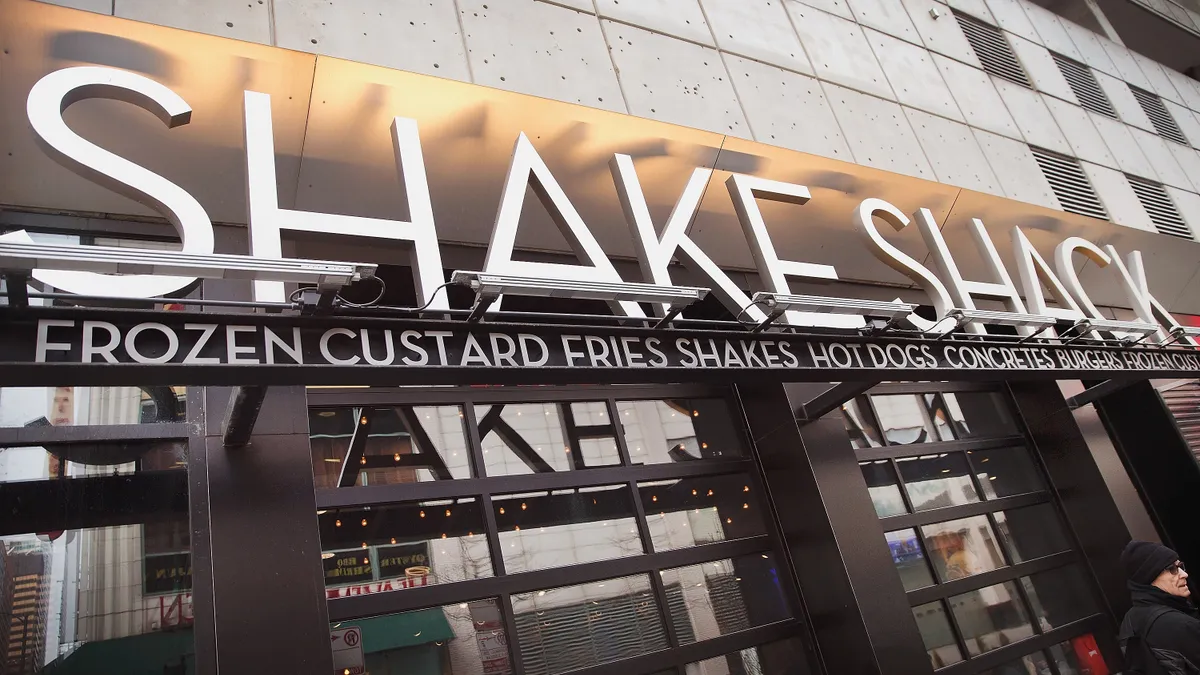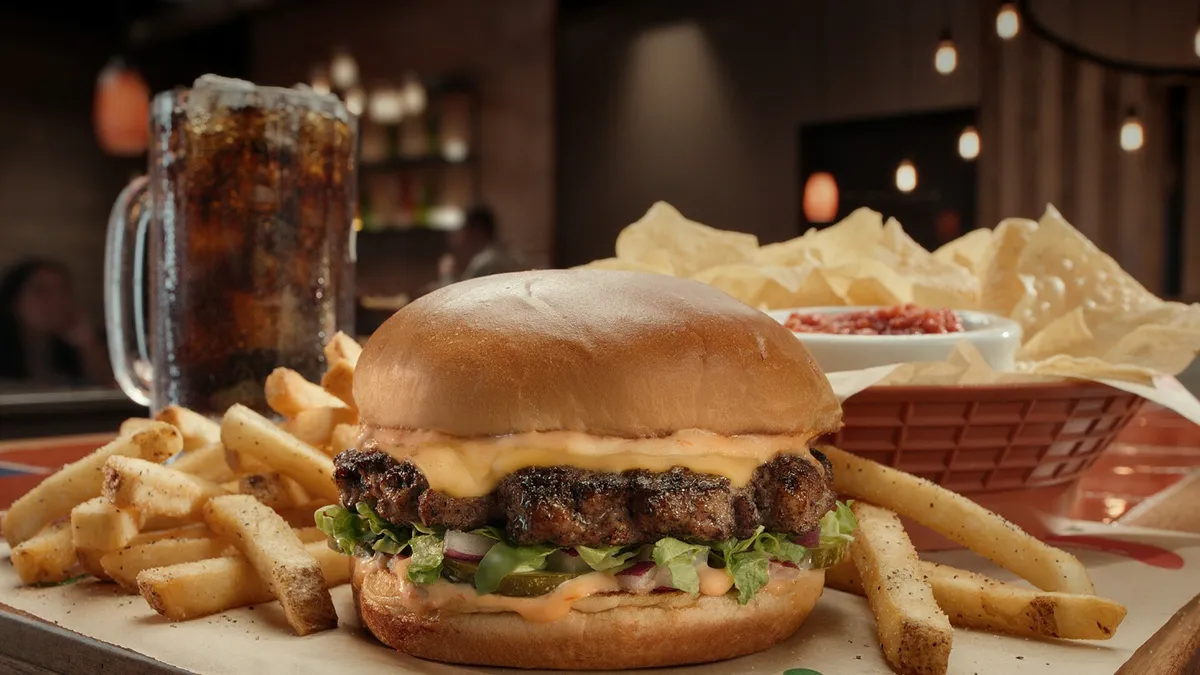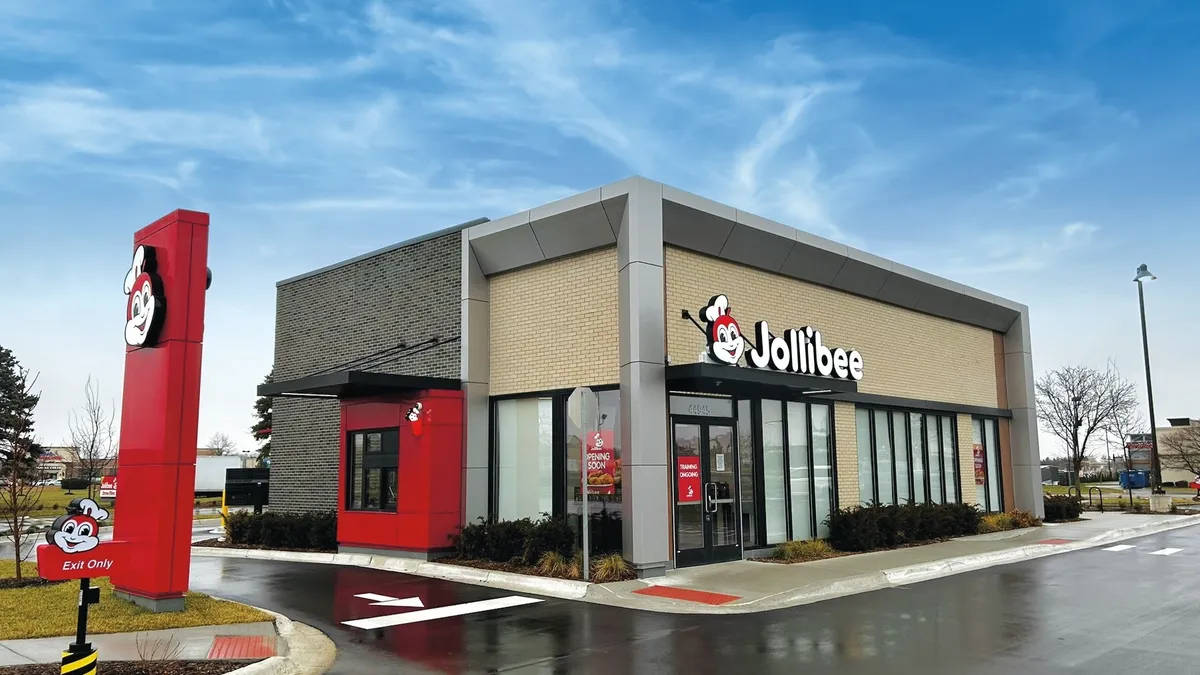This story is part of a series of pieces looking at trends in the industry. Read more with our look at 5 restaurant trends that will define 2020.
Droves of major QSRs have snapped up deals with Beyond Meat and Impossible Foods to capitalize on the lucrative plant-based trend. But does faux meat have real financial staying power for restaurants?
Recently, it seems the trend's halo has lost some of its shine.
Just last week, Burger King lowered the price of its Impossible Whopper due to sliding sales. Franchisee Carrols Restaurant Group said at the ICR conference earlier this month that its stores now sell around 28 Impossible Whoppers per day, compared to its previous average of 32. The burger is now offered on the restaurant’s two-for-$6 menu — significantly cheaper than its initial price of $5.59.
A Burger King franchisee from Little Rock, Arkansas told Bloomberg that his stores are selling fewer than 20 Impossible Whoppers per day compared to 30 per day when it first launched, and that he may be selling the product at a loss.
This is a surprising departure from the plant-based patty's initial performance. Burger King's trial of the Impossible Whopper at select St. Louis restaurants last August drove an 18% jump in traffic compared to its Kansas City locations. In Q3 2019, the Impossible Whopper contributed 5% of the chain's comp sales in the U.S.
Burger King's recent plant-based slump isn't an anomaly, either. Last fall, Tim Hortons began to roll back Beyond Meat products at the majority of its Canadian restaurant locations, just three months after it first introduced the plant-based protein maker’s products. The chain now only offers the Beyond Meat breakfast sandwich in Ontario and British Columbia, where demand is strong. It also offered the Beyond Burger nationwide, but only as an LTO.
Still, analysts contend that the meat analogue category won't fade from restaurant menus anytime soon. Denny's, for example, announced Monday that it will bring its Beyond Meat burger to stores in the U.S. and Canada after a successful test in Los Angeles. But restaurants that view plant-based burgers as a key to unlocking powerful new revenue streams should be wary. Only around 280 million veggie burgers are sold in the U.S. each year, compared to nearly 8 billion beef burgers, David Portalatin, VP and food industry advisor at NPD Group, told Restaurant Dive.
"It's important for everybody to remember that consumption of meat analogues is a very small behavior and always will be," Portalatin said. "On average, meat analogues are only consumed four times annually per capita compared to 108 times per capita for poultry."
Health perception drives demand
Plant-based meat does meet growing consumer demand for vegetarian fare, however, which they view as healthier than meat, Portalatin said.
This sentiment isn't rooted in science, however. Studies have shown that plant-based patties from Impossible and Beyond have nearly identical caloric value when compared to beef patties, and contain higher levels of sodium. Still, the perception is the primary driver for meat analogue purchases, Portalatin said.
“The American consumer is increasingly very tribal in their definition of what's healthy,” he said. “It depends on what influencer we’re following, what our friends and neighbors are saying. And oftentimes, perhaps more credible voices of nutritionists or dietitians are getting lost in that.”
Animal welfare and sustainability concerns are also purchase motivators, but come second to diner interest in improved nutrition, he said.
It's a top concern for restaurants, as well. Several chains, including Chipotle and Panera, have said that they won't partner with a plant-based meat company because the products are too processed and come frozen.
"The American consumer is increasingly very tribal in their definition of what's healthy. It depends on what influencer we're following, what our friends and neighbors are saying. And oftentimes, perhaps more credible voices of nutritionists or dietitians are getting lost in that."

David Portalatin
VP and food industry advisor, NPD Group
B. GOOD is one such restaurant. The better-for-you fast casual chain launched four new meat-free burgers in September that push the flavors and textures of the vegetables in their patties instead of trying to make them look or taste like beef.
"We don’'t like to have anything processed or artificial on the menu. If we're going to introduce a plant-based burger, it's going to use real plants," B. Good CEO Chris Fuqua told Restaurant Dive.
Aside from upholding the brand's pledge to use fresh, whole ingredients, Fuqua also said the more traditional veggie burgers prioritize flavor.
"We created a whole bunch of products and had some of our more loyal customers taste them … against the Impossible Burger and against the Beyond Burger and [ours] overwhelmingly won the consumer taste test," he said. "You want to make sure you put taste at the forefront."
But consumer demand for fresh, farm-to-table ingredients could be overshadowed by the ubiquity of Impossible and Beyond products, Portalatin said, which have made the concept of plant-based burgers synonymous with a dupe for a beef patty in taste, texture and mouthfeel.
"If this was really about eating more plants, we’d see vegetable consumption going up. It's not," Portalatin said. "What the big shift is [with] all these new meat analogues is [that] we’re defining or changing what the expectation is for a veggie burger in terms of taste and texture."
Meat analogues have changed expectations for veggie burger experience
The demand for this specific product experience will hold sales of these products steady for the foreseeable future, former Euromonitor analyst and current project manager with the Energy Institute at UC Berkeley Miranda Lambert told Restaurant Dive.
"A lot of people now, such as myself, are giving up meat not because they don't like meat or even because they are pro-animal, but because of the sustainability aspect," Lambert said. "I miss meat. I don't want a black bean burger that falls apart in my mouth."
Because of this phenomenon, Portalatin predicts that restaurant chains can still temporarily boost traffic and spark excitement around their brands through partnerships with Beyond and Impossible.
"We've gone through the initial trial where everybody [had] to go out and try it. And now we're going to settle back into a more sustainable base of users, but it'll be an elevated base of users from where we were in the past,” he said. “Anytime you take a category … and established behavior in American consumption and you innovate or elevate the form of that category, you get tremendous growth from it."
"A lot of people now, such as myself, are giving up meat not because they don't like meat or even because they are pro-animal, but because of the sustainability aspect. I miss meat. I don't want a black bean burger that falls apart in my mouth."

Miranda Lambert
Former Euromonitor analyst
It's possible that if McDonald's launches a plant-based meat product in the U.S. — it is currently testing a vegetarian burger called the P.L.T. with Beyond Meat in Canada — that the chain will have its usual "McDonald's effect" on the U.S. QSR space and spark further partnerships with meat analogue manufacturers.
"There’s McDonald's, Burger King and Wendy's that have [plant-based burgers] and then you have this middle tier of chains like In-N-Out, Five Guys and Whataburger [that] have not adopted this at all," Lambert said. "I'm interested to see what they do."
The runway for innovation with plant-based meat is also long enough to keep opportunities around plant-based meat hot for restaurants, Portalatin said.
"We're already seeing a lot of diversity in new innovation that's coming out. We're seeing plant-based pork in the marketplace, plant-based fish,” he said. "Let’s face it, [plant-based meat] is one of the most interesting innovations that's come around in a long, long time."



